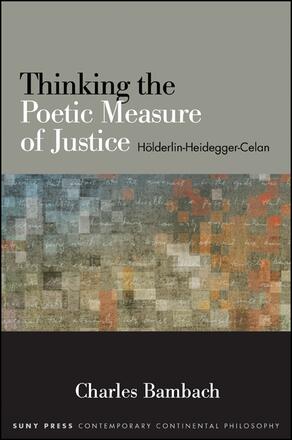
Thinking the Poetic Measure of Justice
Hölderlin-Heidegger-Celan
Alternative formats available from:
A new reading of justice engaging the work of two philosophical poets who stand in conversation with the work of Martin Heidegger.
Description
What is the measure of ethics? What is the measure of justice? And how do we come to measure the immeasurability of these questions? Thinking the Poetic Measure of Justice situates the problem of justice in the interdisciplinary space between philosophy and poetry in an effort to explore the sources of ethical life in a new way. Charles Bambach engages the works of two philosophical poets who stand as the bookends of modernity—Friedrich Hölderlin (1770–1843) and Paul Celan (1920–1970)—offering close textual readings of poems from each that define and express some of the crucial problems of German philosophical thought in the twentieth century: tensions between the native and the foreign, the proper and the strange, the self and the other. At the center of this philosophical conversation between Hölderlin and Celan, Bambach places the work of Martin Heidegger to rethink the question of justice in a nonlegal, nonmoral register by understanding it in terms of poetic measure. Focusing on Hölderlin's and Heidegger's readings of pre-Socratic philosophy and Greek tragedy, as well as on Celan's reading of Kabbalah, he frames the problem of poetic justice against the trauma of German destruction in the twentieth century.
Charles Bambach is Professor of Philosophy at the University of Texas at Dallas. He is the author of Heidegger's Roots: Nietzsche, National Socialism, and the Greeks and Heidegger, Dilthey, and the Crisis of Historicism.